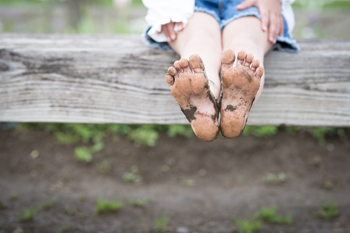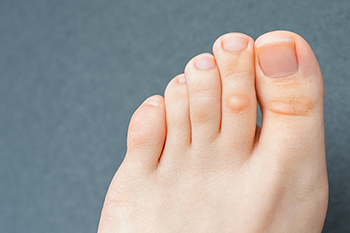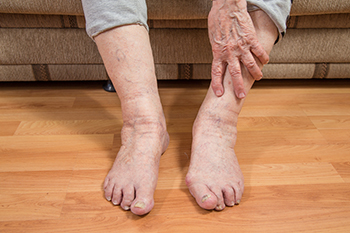
Flat feet, also known as pes planus, is characterized by a collapse in the arch of the foot and a sagging of the heel. Babies are born with flat feet, but around 3 to 5 years of age, the arch begins to develop. There are three types of flat feet. Flexible flat feet impacts both feet, is typical in children, and does not cause pain. Flexible flat feet with a shortened Achilles tendon are rarely seen in kids and can cause pain, even disability. Rigid flat feet are least common and affects those with problems in the tarsal bones of the feet. This last type of flat feet is as likely to impact both feet as not and will often lead to disability and pain. If one suspects their child has flat feet and this has not resolved by around age 8 or if pain is involved, it is suggested that a podiatrist be consulted to examine the child’s feet and develop the best plan to treat the condition.
Flatfoot is a condition many people suffer from. If you have flat feet, contact one of our podiatrists from PA Foot & Ankle Associates. Our doctors will treat your foot and ankle needs.
What Are Flat Feet?
Flatfoot is a condition in which the arch of the foot is depressed and the sole of the foot is almost completely in contact with the ground. About 20-30% of the population generally has flat feet because their arches never formed during growth.
Conditions & Problems:
Having flat feet makes it difficult to run or walk because of the stress placed on the ankles.
Alignment – The general alignment of your legs can be disrupted, because the ankles move inward which can cause major discomfort.
Knees – If you have complications with your knees, flat feet can be a contributor to arthritis in that area.
Symptoms
- Pain around the heel or arch area
- Trouble standing on the tip toe
- Swelling around the inside of the ankle
- Flat look to one or both feet
- Having your shoes feel uneven when worn
Treatment
If you are experiencing pain and stress on the foot you may weaken the posterior tibial tendon, which runs around the inside of the ankle.
If you have any questions please feel free to contact one of our offices located in Allentown, Easton, Northampton, and Chew Street in Allentown, PA . We offer the newest diagnostic and treatment technologies for all your foot and ankle needs.

Corns are small, round patches of thickened skin. Hard corns usually develop on the smaller toes due to shoes rubbing against them. Soft corns are more rubbery in texture, and typically develop in between the toes. They are softer due to sweat between the toes that keep them moist. Factors such as thin skin, boney toes, or deformities such as hammertoes and bunions can make a person more likely to develop corns. The best way to avoid corns from developing is to wear shoes that fit properly and have room in the toes. High heels and pointy shoes force the toes into unnaturally tight spaces that can cause them to rub against each other and the shoe. A corn can become painful when shoes press down on the corn, forcing it down on the underlying layers of skin. In rare cases, a corn can become infected. It is wise to contact a podiatrist who can effectively and safely treat corns. This is especially important for people with diabetes and the elderly.
Corns can make walking very painful and should be treated immediately. If you have questions regarding your feet and ankles, contact one of our podiatrists of PA Foot & Ankle Associates. Our doctors will treat your foot and ankle needs.
Corns: What Are They? And How Do You Get Rid of Them?
Corns are thickened areas on the skin that can become painful. They are caused by excessive pressure and friction on the skin. Corns press into the deeper layers of the skin and are usually round in shape.
Ways to Prevent Corns
There are many ways to get rid of painful corns such as:
- Wearing properly fitting shoes that have been measured by a professional
- Wearing shoes that are not sharply pointed or have high heels
- Wearing only shoes that offer support
Treating Corns
Although most corns slowly disappear when the friction or pressure stops, this isn’t always the case. Consult with your podiatrist to determine the best treatment option for your case of corns.
If you have any questions please feel free to contact one of our offices located in Allentown, Easton, Northampton, and Chew Street in Allentown, PA . We offer the newest diagnostic and treatment technologies for all your foot and ankle needs.

As one ages, it is important that foot care be maintained as their feet have worked for them for a long time and are apt to suffer from some wear and tear. At the least, an elderly person’s feet tend to flatten, widen, and have less padding that leaves bones and joints more unstable. Seemingly small problems like ingrown toenails or a minor cut can result in a barrage of health conditions that can impact an older adult’s health and well-being. Having healthy feet helps seniors to remain mobile, independent, and upright. Essential to good foot care are keeping one’s feet clean, proper drying and moisturizing of feet, wearing well-fitting socks and shoes that do not rub or cause friction, trimming toenails straight across, and monitoring any developing sores. An elderly person who cannot do these things for themselves, can enlist the services of a podiatrist and through regular visits, keep their feet in tip-top shape, and prevent burgeoning problems from worsening.
If you need your feet checked, contact one of our podiatrists of PA Foot & Ankle Associates. Our doctors will attend to all of your foot and ankle needs and provide you with quality treatment.
Geriatrics and Podiatry
When people age, some common issues that may occur are bone density loss, dry skin, poor circulation, and rough brittle nails. These issues may also affect your foot health if the necessary steps are not taken to alleviate the problems.
It is important to take care of your feet because feet that are injured or diseased can affect your overall health. Having painful feet hinders your ability to do daily activities or may decrease your willingness to do the things that you need to do.
Visiting Your Geriatrician
As we age, health problems become more likely, so it is essential to visit your doctor for check-ups to ensure that you are doing the best you can to take care of your health. It is recommended to check your feet frequently for any possible cuts, bruises, swelling, corns or any other irregularities.
Taking Care of Elderly Feet
Cracked or dry feet can be treated by applying moisturizer often. It is also important not to wear old socks because the older the sock is, the higher the possibility there will be that there is bacteria there. Wear fresh socks and make sure they fit properly.
Proper foot health means that you can have a more active lifestyle and you will not be bogged down by pain. Foot health also leads to good circulation, which is paramount for overall health.
If you have any questions, please feel free to contact one of our offices located in Allentown, Easton, Northampton, and Chew Street in Allentown, PA . We offer the newest diagnostic tools and technology to treat your foot and ankle needs.

